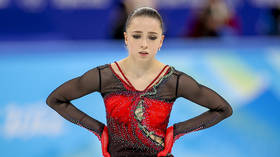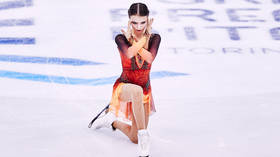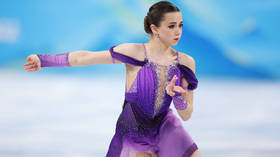Skating chiefs raise minimum age for competitors

Competitors will soon need to be 17 years of age to take part in the International Skating Union's (ISU) senior events after its members voted in favor of a landmark change viewed as a response to the plight of Russian figure skating prodigy Kamila Valieva at the Beijing 2022 Winter Olympics.
The proposal was accepted at the ISU's Congress in Phuket and means that the age limit for figure skating competitions will be raised from 15 to 16 ahead of the 2023-2024 season and 17 after that which will impact the 2026 Milano Cortina Winter Olympics in Italy.
A total of 100 Member Federations voted in favor of introducing the proposal – which also applies to synchronized skating, speed skating and short track speed skating – as 16 opposed it and two abstained from voting.
The result reportedly prompted applause and cheers around the room at the Hilton Phuket Arcadia Resort and Spa where the congress is being held, and ISU President Jan Dijkema hailed the development a "very historic decision" with "protecting the physical and mental health, and emotional wellbeing of skaters" cited as the key factor in the move.
Helping the Russian Olympic Committee (IOC) win the Team event in the Chinese capital, Valieva was then a favorite for the women's Individual event until a failed drug test emerged some six weeks after she had completed it on Christmas Day at the Russian championships.
Valieva had tested positive for the banned substance trimetazidine used to treat angina, with the Russian Anti-Doping Agency (RUSADA) blaming complications at a Stockholm laboratory where the test samples were sent for the delay.
Though the teenager received a provisional ban, this was lifted by the Court of Arbitration for Sport (CAS) after a series of appeals, as the Swiss-based authority pointed to her status as a protected person and noted that her not being allowed to compete would cause Valieva "irreparable harm".
Yet Valieva, who seemed to have been clearly affected by the scandal, finished fourth overall in the Individual event after a string of uncharacteristic stumbles and falls as the ROC completed a 1-2 gold and silver haul headed by Anna Shcherbakova and Alexandra Trusova.
Figures such as International Olympic Committee (IOC) president Thomas Bach questioned the "chilling" conduct of Valieva's coach Eteri Tutberidze after her charge was brought to tears by her errors but received little comfort.
And while the doping case still hasn't been resolved, with RUSADA allowed a six-month window until the end of August from the date of Valieva's alleged offense to reach a decision over sanctions, the ISU has made changes in the meantime.
"After the Olympic Games, we became under pressure from the media point of view, questioning the credibility of the ISU," highlighted ISU director general Fredi Schmid.
"The defense line was there in a proposal on the table to increase the age limit which helped us so that didn’t become a major issue, but clearly from the media we received an enormous amount of questions," he added.
Some of those that the ISU were asked, explained Schmid, was how the body allowed skaters so young to compete under such emotional pressure, which shouldn't be allowed.
Schmid described this as a "major attack", and hailed the day of the ruling as the "moment of truth" while believing that the media and public will watch the ISU "very closely".
Elsewhere, ISU Athletes Commission member and Canadian skater Eric Radford described the life of an athlete as "short and intense", with their experiences within it setting the platform for the rest of their normal lives post-retirement "physically, spiritually, [and] emotionally".
"While I hear the concerns of certain nations about the immediate difficulty that they might face with this proposal being passed... is a medal really worth the life of a young athlete?" Radford asked.














